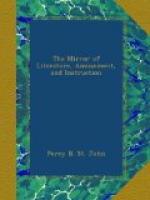In Germany Campbell made the friendship of the two Schlegels, of many of the first literary and political characters, and was fortunate enough to pass an entire day with the venerable Klopstock, who died just two years afterwards. The proficiency of Campbell in the German language was rendered very considerable by this tour, and his own indefatigable perseverance in study. His travels in Germany occupied him thirteen months; when he returned to England, and, for the first time, visited London. He soon afterwards composed those two noble marine odes, The Battle of the Baltic, and Ye Mariners of England, which, with his Hohenlinden, stand unrivalled in the English tongue; and though, as Byron lamented, Campbell has written so little, these odes alone are enough to place him unforgotten in the shrine of the Muses.
In 1803 the poet married Miss Sinclair, a lady of Scottish descent, and considerable personal beauty, but of whom he was deprived by death in 1828. He resided at Sydenham, and the entire neighbourhood of that pleasant village reckoned itself in the circle of his friends; nor did he quit his suburban retreat until, in 1821, literary pursuits demanded his residence in the metropolis. It was at Sydenham, in a house nearly facing the reservoir, that the poet produced his greatest work, Gertrude of Wyoming, written in the Spenserian stanza. About the same time Campbell was appointed Professor of Poetry in the Royal Institution, where he delivered lectures which have since been published. He also undertook the editorship of Selections from the British Poets, intended as specimens of each, and accompanied with critical remarks.[3]
[3] This work is in seven
handsome library volumes; a new edition
was
announced two or three years since, but has not yet
appeared.
Soon after the publication of his “Specimens,” he revisited Germany, and passed some time in Vienna, where he acquired a considerable knowledge of the Austrian court and its manners. He remained long at Bonn, where his friend, W.A. Schlegel, resides. Campbell returned to England in 1820, to undertake the editorship of the New Monthly Magazine, and coupled with his name, it has risen to a very extensive circulation. In 1824, Campbell published his “Theodric, a Domestic Tale,” the least popular of his works.
By his marriage Campbell had two sons. One of them died before attaining his twentieth year; the other, while in the University of Bonn, where he was placed for his education, exhibited symptoms of an erring mind, which, on his return to England soon afterwards, ripened into mental derangement of the milder species. After several years passed in this way, during which the mental disease considerably relaxed, so that young Campbell became wholly inoffensive, and his father received him into his house. The effect of this upon a mind of the most exquisite sensibility like the poet’s, may be readily imagined: it was, at times, a source of the keenest suffering.




